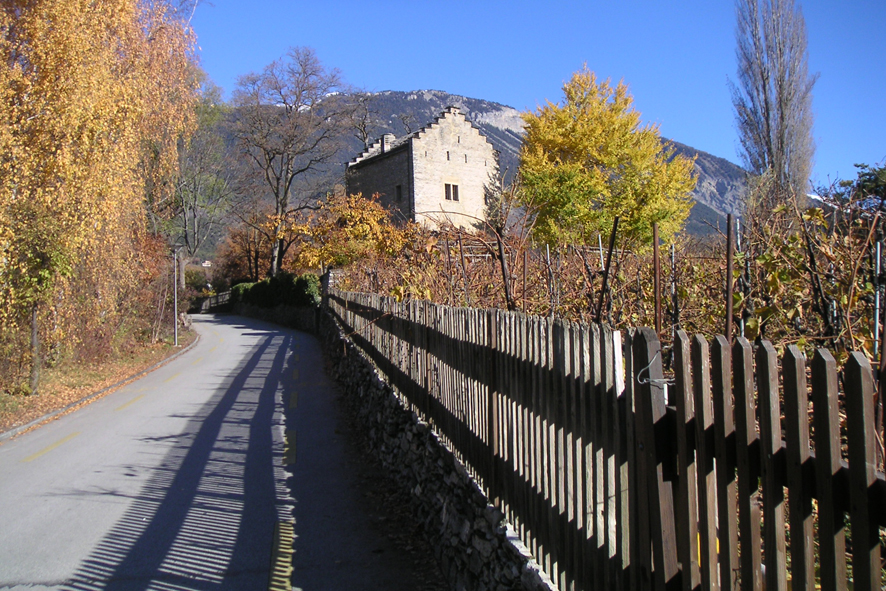Château De Muzot on:
[Wikipedia]
[Google]
[Amazon]
 Château de Muzot (also known as Maison Muzot or Muzot Castle) is a 13th-century fortified manor house located near Veyras in
Château de Muzot (also known as Maison Muzot or Muzot Castle) is a 13th-century fortified manor house located near Veyras in
 Château de Muzot (also known as Maison Muzot or Muzot Castle) is a 13th-century fortified manor house located near Veyras in
Château de Muzot (also known as Maison Muzot or Muzot Castle) is a 13th-century fortified manor house located near Veyras in Switzerland
). Swiss law does not designate a ''capital'' as such, but the federal parliament and government are installed in Bern, while other federal institutions, such as the federal courts, are in other cities (Bellinzona, Lausanne, Luzern, Neuchâtel ...
's Rhone Valley.
In 1921, it was purchased by Swiss merchant and arts patron Werner Reinhart Werner Reinhart (19 March 1884 – 29 August 1951) was a Swiss merchant, philanthropist, amateur clarinetist, and patron of composers and writers, particularly Igor Stravinsky and Rainer Maria Rilke. Reinhart knew and corresponded with many artist ...
who then invited Bohemian-Austrian poet Rainer Maria Rilke
René Karl Wilhelm Johann Josef Maria Rilke (4 December 1875 – 29 December 1926), shortened to Rainer Maria Rilke (), was an Austrian poet and novelist. He has been acclaimed as an idiosyncratic and expressive poet, and is widely recogni ...
(1875–1926) to live there rent-free. It was at Muzot, during a few weeks in February 1922, that Rilke after a long silence caused by severe depression finally completed the ''Duino Elegies
The ''Duino Elegies'' (german: Duineser Elegien) are a collection of ten elegies written by the Bohemian-Austrian poet Rainer Maria Rilke. He was then "widely recognized as one of the most lyrically intense German-language poets", and began ...
'' and wrote the entire ''Sonnets to Orpheus
The ''Sonnets to Orpheus'' (german: Die Sonette an Orpheus) are a cycle of 55 sonnets written in 1922 by the Bohemian-Austrian poet Rainer Maria Rilke (1875–1926). It was first published the following year. Rilke, who is "widely recognized as ...
'' (both published in 1923).
Rilke: ''Duino Elegies'' and ''Sonnets to Orpheus''
From 1921 to 1926, Muzot was the home of Bohemian-Austrian poetRainer Maria Rilke
René Karl Wilhelm Johann Josef Maria Rilke (4 December 1875 – 29 December 1926), shortened to Rainer Maria Rilke (), was an Austrian poet and novelist. He has been acclaimed as an idiosyncratic and expressive poet, and is widely recogni ...
(1875–1926). Here, after ten years of work and delays, in February 1922 Rilke finished work on the ''Duino Elegies
The ''Duino Elegies'' (german: Duineser Elegien) are a collection of ten elegies written by the Bohemian-Austrian poet Rainer Maria Rilke. He was then "widely recognized as one of the most lyrically intense German-language poets", and began ...
'', a collection of ten long poems concerning deeply mystical and philosophical themes. Muzot appears in a reference within the poem cycle ''Sonnets from China'' (1936) by British poet W.H. Auden
Wystan Hugh Auden (; 21 February 1907 – 29 September 1973) was a British-American poet. Auden's poetry was noted for its stylistic and technical achievement, its engagement with politics, morals, love, and religion, and its variety in ...
(1907–1973) who was inspired by Rilke.
The reference here to stroking "that little tower" is Muzot, and is derived from a series of letters written while Rilke was completing the ''Elegies'' including a letter he wrote to his current loverTonight in China let me think of one Who through ten years of silence worked and waited, Until in Muzot all his powers spoke, And everything was given once for all. And with the gratitude of the Completed He went out in the winter night to stroke That little tower like a great old animal
Baladine Klossowska
Baladine Klossowska or Kłossowska (21 October 1886 — 11 September 1969) was a German painter. Originating from an artistic Jewish family with roots in Lithuania, she moved from Breslau, Germany (now Wrocław, Poland) to Paris, France, at the t ...
, and one to his former lover, Lou Andreas-Salomé
Lou Andreas-Salomé (born either Louise von Salomé or Luíza Gustavovna Salomé or Lioulia von Salomé, russian: link=no, Луиза Густавовна Саломе; 12 February 1861 – 5 February 1937) was a Russian-born psychoanalyst and a ...
. In the letter to Andreas-Salomé, he writes "I went out and stroked the little Muzot, which protected it and me and finally granted it, like a large old animal.".Rilke to Lou Andreas-Salomé (11 February 1922) in Rilke, Rainer Maria and Andreas-Salomé, Lou. Briefwechsel (Insel, 1952), 464.
References
{{DEFAULTSORT:Muzot, Chateau de Rainer Maria Rilke Castles in the canton of Valais Buildings and structures completed in the 13th century